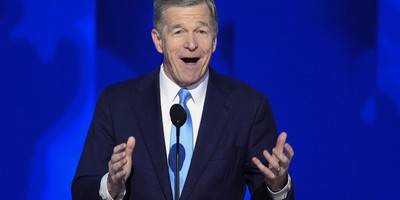This is the story of a bank. It wasn’t one of those irresponsible banks that rode the subprime boom until the bottom fell out. It was a bank that hedged its risks, a bank that made sure its balance sheets added up.

That bank was called Bank of America. And certain government officials are now talking about nationalizing it. What happened? Bank of America got in bed with the government.
Starting in January 2008, Bank of America, which had zero subprime exposure, decided to step in and buy Countrywide, a company quickly spiraling out of control due to its heavy emphasis on risky mortgage lending. Bank of America saw an opportunity to write off Countrywide’s losses and use its resources for the coming refinancing boom. According to Bank of America CEO Ken Lewis, the government made no backdoor deals with B of A to buy up Countrywide. But the enthusiastic response of government officials ranging from Rep. Barney Frank, D-Mass., to Sen. Chuck Schumer, D-N.Y., suggests the significant possibility of a covert guarantee by the government to pick up the slack in case Countrywide’s loans went bad.
Whether or not the government was involved in the Countrywide purchase, it was certainly involved in Bank of America’s next big deal: the acquisition of Merrill Lynch. Like Countrywide, Merrill Lynch had significant exposure to the subprime market. And like Countrywide, it was on the verge of bankruptcy. In September 2008, government officials began talking up the idea of government interventionism -- creating a Troubled Assets Relief Program designed to buy up bad mortgages. Encouraged by such talk, Lewis fell in love with the idea of buying up Merrill Lynch. On Sept. 15, he made the initial offer to buy Merrill Lynch in a whopping $50 billion all-stock deal.
Recommended
There was only one problem: Lewis did not anticipate that the government would renege on its TARP promises. In October 2008, President George W. Bush and Treasury Secretary Henry Paulson announced that TARP funds would be used to buy preferred stock in ailing banking institutions. Instead of taking bad assets off the books, the government would be buying into banking. In November, Paulson announced that nine of the nation’s largest banks would be taking $125 billion in government capital. Refusal was not an option.
Meanwhile, Merrill’s losses began to accrue more and more rapidly. By December, Merrill was showing a pre-tax loss of $21 billion.
And so, in December, Lewis tried to back out of the deal. He tried to claim that Merrill’s rapidly accruing losses were unforeseen, and that there had been a material change in Merrill’s financial situation. The government wasn’t buying it. According to the Wall Street Journal, on Dec. 19, Federal Reserve Bank Chief Ben Bernanke and assorted Fed officials told Lewis that B of A could not pull out of the deal -- that if the Merrill deal fell through, B of A could expect no help from the government at any time in the future. Not only that, if the deal fell through, government “would consider ousting executives and directors.”
The government offered Lewis a way out: The government would fork over $20 billion to B of A to help counterbalance the losses. B of A would have to limit executive compensation, including bonuses.
On Jan. 16, Bank of America revealed to its shareholders that it had incurred $1.79 billion in quarterly losses. Lewis’ comment: “We did think we were doing the right thing for the country.”
Now Bank of America stands on the brink of annihilation. The government owns 6 percent of B of A, making it the bank’s largest shareholder.
And the government isn’t afraid to throw its weight around. As it has done with Fannie Mae and Freddie Mac, the government will use its newfound power. The New York Times reported on March 2 that the government nationalization of Fannie Mae and Freddie Mac was likely permanent -- and that members of Congress were pushing the massive mortgage institution to give more affordable housing loans, the same sort of loans that brought about the current crisis.
Left to its own devices, Bank of America did business the right way. Once Bank of America began relying on the government for help, however, it was only a matter of time before B of A became a tool of the federal government rather than a beneficiary of government benevolence. Americans, many of whom are all too eager to take government cash, should take note. Once you play ball with the government, it’s only a matter of time before you strike out.

























Join the conversation as a VIP Member